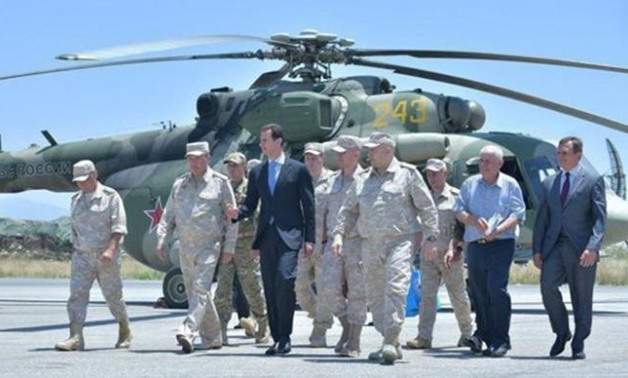
Syria's President Bashar al-Assad visits a Russian air base at Hmeymim, in western Syria in this handout picture posted on SANA on June 27, 2017, Syria -REUTERS
Washington/Moscow - 27 June 2017: The United States warned Syria's leadership against staging a chemical weapons attack after Washington detected what appeared to be active preparations at a Syrian airfield used for such an attack in April, U.S. officials said on Tuesday.
Russia, Syrian President Bashar al-Assad's main international backer, denounced the warning and dismissed White House assertions that a strike was being prepared as "unacceptable," raising the tension between Washington and Moscow over the Syrian civil war.
Pentagon spokesman Captain Jeff Davis said the United States had recently seen activity at Shayrat airfield, the same base targeted by a U.S. cruise missile strike on April 6.
Davis said the activity was from "the past day or two." He did not say how the United States collected its intelligence.
"This involved specific aircraft in a specific hangar, both of which we know to be associated with chemical weapons use," Davis said.
The White House said on Monday it appeared the Syrian government was preparing for another chemical weapons attack and it warned Assad that he and his military would "pay a heavy price" if it went ahead.
The U.S. strike on the Shayrat airfield followed the deaths of 87 people in what Washington said was a poison gas attack in rebel-held territory two days earlier. Syria denied it carried out the attack.
The White House said the recent preparations in Syria were similar to actions before the April attack.
But Russia challenged the U.S. intelligence.
"I am not aware of any information about a threat that chemical weapons can be used," Kremlin spokesman Dmitry Peskov told a conference call with reporters on Tuesday.
"Certainly, we consider such threats to the legitimate leadership of the Syrian Arab Republic unacceptable."
Russian officials have privately described the war in Syria as the biggest source of tension between Moscow and Washington, and the April cruise missile strike ordered by U.S. President Donald Trump raised the risk of confrontation between them.
The Syrian military and foreign ministry did not immediately comment on the White House statement though a Syrian state-run television station, al-Ikhbariya, said the White House's allegations were fabricated.
White House officials did not respond to requests for comment on the intelligence that prompted the statement, or on possible U.S. plans if Syria carried out such an attack.
U.S. ambassador to the United Nations Nikki Haley said the Trump administration intended its warning to be aimed not just at Syria's government but also at Russia and Iran, another supporter of Assad.
"I believe that the goal is, at this point, not just to send Assad a message but to send Russia and Iran a message that if this happens again we are putting you on notice," Haley said in a hearing in the U.S. House of Representatives.
Britain backs Washington
British Defense Minister Michael Fallon said London would support U.S. action to prevent a chemical weapons attack but that it had not seen the intelligence on which Washington based Monday's statement.
"As always in war, the military action you use must be justified, it must be legal, it must be proportionate, it must be necessary. In the last case (in April), it was," Fallon told the BBC. "If the Americans take similar action again, I want to be very clear - we will support it."
U.S. and allied intelligence officers had for some time identified several sites where they suspected Assad's government may have been hiding newly made chemical weapons from inspectors, said a U.S. official familiar with the intelligence.
That assessment was based in part on the locations, security surrounding the suspect sites and other information which the official declined to describe.
Although the intelligence was not considered conclusive, Washington decided to issue the public warning to the Syrian leadership to try to deter such a strike, said the official, who declined to discuss the issue further.
The number of people killed in suspected chemical attacks is a small portion of the total dead in Syria's civil war - a figure which the Syrian Observatory for Human Rights, a Britain-based war monitor, estimates is close to half a million.
But television footage of victims of April's attack, including children, writhing in agony and being hosed down apparently to wash chemicals from their bodies, caused revulsion across the world.
After the April attack, Trump accused Assad's government of going "beyond a red line" and approved what U.S. officials called a "one-off" strike to deter future chemical attacks.
The United States has taken a series of actions over the past three months demonstrating its willingness to carry out strikes, mostly in self-defense, against Syrian government forces and their backers, including Iran.
Washington has repeatedly struck Iranian-backed militia and even shot down a drone threatening U.S.-led coalition forces since the April military strike. The U.S. military shot down a Syrian jet earlier this month.
Trump has also ordered stepped-up military operations against the Islamic State militant group and delegated more authority to his generals.


Comments
Leave a Comment